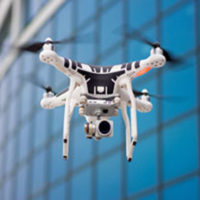Benefits and Dangers of Drones on Construction Sites
June 26, 2019 Unmanned aerial vehicles (UAVs) have been used in the military for years. As drone technology has advanced, however, they have taken on many diverse commercial and personal applications. Now there are drones on construction sites, the construction industry has seen a number of changes thanks to drones. While they can help make some tasks much safer for construction workers, they have also raised a new set of safety concerns on construction sites.
Unmanned aerial vehicles (UAVs) have been used in the military for years. As drone technology has advanced, however, they have taken on many diverse commercial and personal applications. Now there are drones on construction sites, the construction industry has seen a number of changes thanks to drones. While they can help make some tasks much safer for construction workers, they have also raised a new set of safety concerns on construction sites.
Drones Can Help Workers Operate Efficiently
UAVs allow construction workers to see further and higher than they could before. Drones can produce accurate aerial surveys with much less time and effort and can capture and transmit data in real time. They can track progress on various construction projects, providing constant feedback that can improve efficiency. In addition to far-reaching views, UAVs can be helpful in entering tight spaces and avoiding obstacles that workers cannot.
Drones can also be a valuable safety tool on worksites. Conducting surveys and transporting materials using drones can help workers avoid safety hazards, such as high or unsafe structures, unstable terrain, and traffic on roadways. UAVs have helped construction companies improve worksite security, allowing them to constantly monitor sites for intruders and prevent theft or vandalism.
UAVs Can Cause Injury
The use of UAVs continues to evolve and may open up even more possibilities in the future as 3-D mapping technology becomes available. Drone use in construction is still in its early stages, however, and drone-related injuries have been reported. Even when operated by an expert, they could be susceptible to going off course, many due to operator error or inclement weather. Rogue drones can damage equipment or get snagged in trees or power lines. Drones can also crash into or fall on workers, causing severe injury.
Drones are subject to Federal Aviation Administration (FAA) regulation; the size of the drone will determine which precise rules it must comply with, but there are some regulations that apply to all drones. UAVs must be registered and have an FAA registration number on the unit. Drones must stay within the operator’s sight at all times and cannot be flown above 400 feet. When flying a drone, the operator must avoid restricted airspace and maintain a safe distance from other aircraft. Drone pilots must also be licensed with the FAA and undergo thorough training before working on a jobsite; this includes third-party vendors that are hired by a construction company.
Construction companies are always looking to improve efficiency, and it is understandable that they would want to take advantage of drone technology. There must be safeguards put in place, however, in order to use them effectively on a worksite. It is up to employers to keep workers and site visitors safe. Construction accidents can cause devastating injuries that result in permanent disability or death.
Philadelphia Construction Accident Lawyers at Galfand Berger LLP Obtain Compensation for Drone Accident Victims
If you or a loved one has been injured in a construction accident, call the work injury lawyers at Galfand Berger LLP. Our knowledgeable, experienced lawyers will thoroughly review the facts of your case to determine who is at fault for your injury and get you the full compensation to which you are entitled. With offices conveniently located in Philadelphia, Allentown, Lancaster, and Reading, we help injured construction workers and their families throughout Pennsylvania and New Jersey. Call us today at 800-222-USWA (8792) or contact us online for a free consultation with a Philadelphia construction accident lawyer.
 Google Screened
Google Screened
